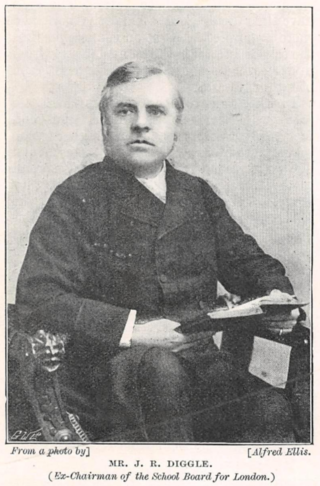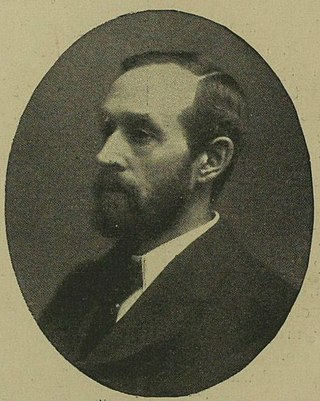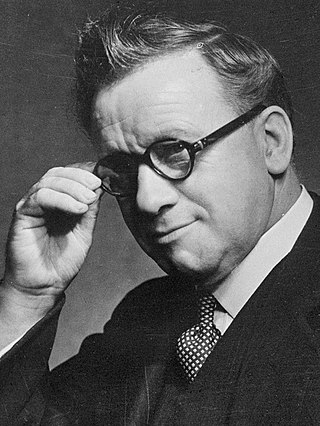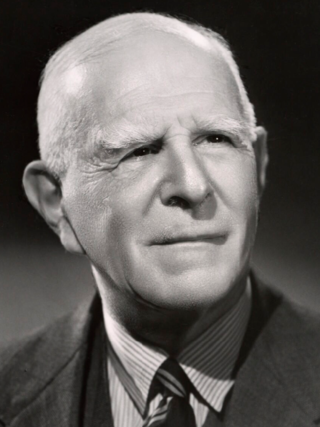
The first elections to the new local authorities established by the Local Government Act 1972 in England and Wales and the new Northern Ireland district councils created by the Local Government Act 1972 took place in 1973. Elections to the existing Greater London Council also took place.
Finsbury East was a parliamentary constituency centred on the Finsbury district of North London, England. It returned one Member of Parliament (MP) to the House of Commons of the Parliament of the United Kingdom, elected by the first past the post system.
The Municipal Reform Party was a local party allied to the parliamentary Conservative Party in the County of London. The party contested elections to both the London County Council and metropolitan borough councils of the county from 1906 to 1945.

The Reverend Joseph Robert Diggle JP was a British Anglican clergyman, politician and public servant. He is notable for his campaign to change the law to allow clergymen to take seats in the House of Commons, and for his chairmanship of the London School Board. His combative approach to political debate was the key to his career, helping him to run the Board for nine years but denying him any higher office.
An election to the County Council of London took place on 5 March 1892. The council was elected by First Past the Post with each elector having two votes in the two-member seats. The Progressive Party retained control of the council, gaining seats from the Moderates.
An election to the County Council of London took place on 3 March 1898. The council was elected by First Past the Post with each elector having two votes in the two-member seats. The Progressive Party won a substantial majority on the council.
An election to the County Council of London took place on 5 March 1904. The council was elected by First Past the Post with each elector having two votes in the two-member seats. The Progressive Party retained control of the council, with a slightly reduced majority.
An election to the County Council of London took place on 2 March 1907. The council was elected by First Past the Post with each elector having two votes in the two-member seats. For the first time, the Progressive Party lost control of the council, being defeated by the recently formed Municipal Reform Party.

An election to the County Council of London took place on 5 March 1913. It was the ninth triennial election of the whole Council. The size of the council was 118 councillors and 19 aldermen. The councillors were elected for electoral divisions corresponding to the parliamentary constituencies that had been created by the Representation of the People Act 1884. There were 57 dual member constituencies and one four member constituency. The council was elected by First Past the Post with each elector having two votes in the dual member seats. Unlike for parliamentary elections, women qualified as electors for these elections on exactly the same basis as men. Women were also permitted to stand as candidates for election.
An election to the County Council of London took place on 5 March 1925. The council was elected by First Past the Post with each elector having two votes in the two-member seats. The Municipal Reform Party retained a large majority, while the Labour Party established itself as the principal opposition, supplanting the Progressive Party.

Richard Stephens Jackson was a British solicitor and Liberal Party politician.

The 1908 Peckham by-election was a parliamentary by-election held for the British House of Commons constituency of Peckham in the Metropolitan Borough of Camberwell, London on 24 March 1908. The seat was won by the opposition Conservative Party candidate, a gain from the Liberal Party who had won a large majority at the 1906 general election.

John Lowles was a British businessman and Conservative Party politician.
The 1914 Wycombe by-election was a Parliamentary by-election held on 18 February 1914. The constituency returned one Member of Parliament (MP) to the House of Commons of the United Kingdom, elected by the first past the post voting system.
The 1913 Chorley by-election was a Parliamentary by-election held on 19 February 1913. It returned one Member of Parliament (MP) to the House of Commons of the United Kingdom, elected by the first past the post voting system. Although it was a safe Unionist seat which was held, the reduction in the Unionist majority was notable.

An election to the County Council of London took place on 4 March 1937. The council was elected by First Past the Post with each elector having two votes in the two-member seats. The Labour Party made gains, increasing their majority over the Municipal Reform Party.

An election to the County Council of London took place on 5 March 1931. The council was elected by First Past the Post with each elector having two votes in the two-member seats. The Municipal Reform Party slightly increased its majority on the council, with overall results matching those from 1925.

An election to the County Council of London took place on 8 March 1928. The council was elected by First Past the Post with each elector having two votes in the two-member seats. The Labour Party made slight gains at the expense of the Municipal Reform Party, which nonetheless retained a substantial majority.
The first election to the County Council of London took place on 17 January 1889. The council was elected by First Past the Post with each elector having two votes in the two-member seats. Although the election was not contested on a party political basis, soon after the election, the majority of councillors formed the Progressive Party.











